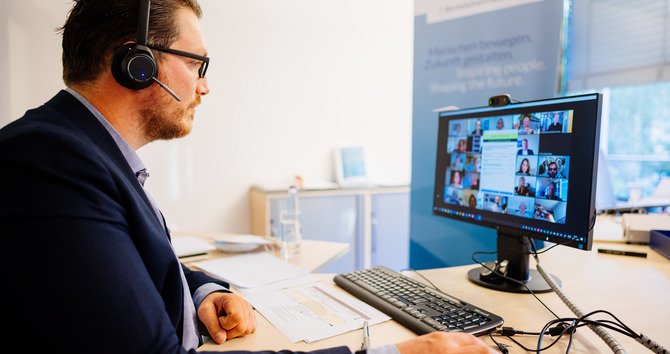The feedback from politicians, local authorities and citizens is consistently positive: Digital Citizens’ Dialogues work just as well as face-to-face meetings! At local level or at transnational Dialogue events with simultaneous translation, the outcome is the same: when citizens exchange views in digital groups, they create intensive dialogues and amazingly concrete, well-reasoned suggestions.

© Besim Mazhiqi
Digital citizen participation works locally and across borders
Digital, but still face to face. Socially distanced, but still up close. Citizens link up with one another in small groups in a video conference, where they recount their experiences and develop joint suggestions for improvement. Between June and December 2020, Bertelsmann Stiftung—in cooperation with ten pilot municipalities—conducted local and transnational Digital Citizens’ Dialogues. We take stock of the outcome here.
Content
90% of participants rated Digital Citizens’ Dialogues “good” or “very good”.
Evaluation result
Digital Citizens’ Dialogues are particularly valuable in the age of coronavirus. Many people are isolated, and there is an especially high demand for a direct exchange between politicians, administration and citizens, but face-to-face meetings and citizens’ workshops are not allowed.
Making contact despite physical remoteness
The “Democracy and Participation in Europe” project took its inspiration from modern video technology when it designed the participative format. Digital Citizens’ Dialogues provide opportunities to impart information, promote person-to-person exchanges, give feedback, and suggest improvements. The format was trialed with groups ranging from 25 to 75 citizens. They meet for two hours for panel and small-group discussions.
Low-threshold access and easy handling of modern video technology
The events are possible thanks to the latest video technology, which offers exciting interactive features and simultaneous translation. Participants do not need to be digital experts. All they need is internet access, a webcam and a microphone, so the technical requirements are modest, handling low-threshold, and (almost) everyone can join in. These are favorable conditions for citizens to participate in political debates and decision-making.
90% of participants stated that they had no problems handling the technology.
Evaluation result
Random selection for greater diversity
The pilot municipalities’ experiences with participant recruitment are unanimously clear: Selecting and inviting citizens at random produces a healthy mixture of age groups, genders and socio-economic backgrounds. This, in turn, ensures that a wide range of different experiences, perspectives and opinions enhance and enrich the discussions.
The best feature of Digital Citizens’ Dialogues is the small group discussion
The breakout sessions in small table or topic groups are the citizens’ favorite. They create a sense of closeness and facilitate intensive discussion. The group discussions were moderated and clearly structured; the participants maintained good discipline and treated each other with respect. The ten pilot municipalities confirm that at least 50 per cent of the overall Dialogue time should be spent on work in small groups. Variation—for example in the form of short presentations, analogue and digital surveys, and alternation between small groups and panel discussions—is equally important.
Also possible in digital form: high-quality suggestions by citizens
All pilot municipalities were surprised at the high quality of discussion results and the new, concrete suggestions that the citizens formulated within a short time. The key was the diversity of the participants and the intensive group discussions which—thanks to digital simultaneous translation—were also possible in the tri-national groups.
Conclusion: With good planning, it is perfectly possible to organize citizen participation in digital form using simple methods. This format is a genuine alternative in the age of coronavirus; in normal times, it could be used to supplement participative formats of citizen participation based on direct encounters and personal contact.
Additional information
The Digital Citizens’ Dialogues address the issues raised by the coronavirus crisis. They provide an opportunity to impart information, exchange personal experiences and ideas, give feedback, and make constructive suggestions for improvement. The Bertelsmann Stiftung has created additional publications based on the experiences gained in the pilot project:
- The handout “Digitale Bürgerdialoge. Eine Chance für die lokale Demokratie” [available in German] gives a concrete description of the methodology, technology and procedures used in the Digital Citizens’ Dialogues.
- The “Materialsammlung” [available in German] enables all interested parties to stage their own Digital Citizens’ Dialogues.
- The documentation “Digitaler Bürgerdialog Trinationaler Eurodistrict Basel Corona und das Zusammenleben in der trinationalen Grenzregion Basel” [available in German and French] gives a direct insight into a bilingual Digital Citizens’ Dialogue conducted recently.
- The documentation “Next level EU citizen participation. Transnational digital dialogue with citizens from Denmark, Germany, Ireland, Italy and Lithuania” [available in English] shows that citizen participation with randomly selected citizens from several countries in different languages is possible—not only offline, but also online.




![[Translate to English:] Menschen diskutieren beim Bürgerdialog](/fileadmin/files/_processed_/b/e/csm_1045556754Europawerkstatt-9302_1069ead8ad.jpg)


